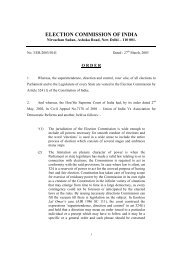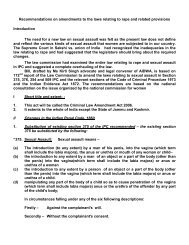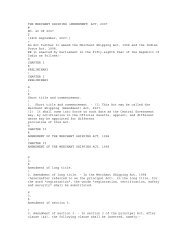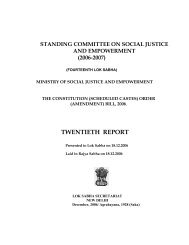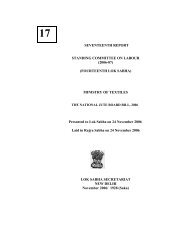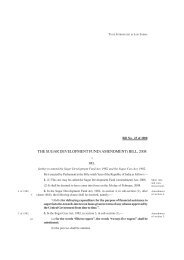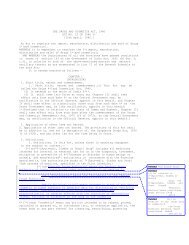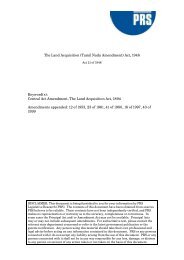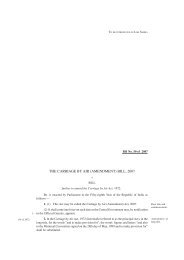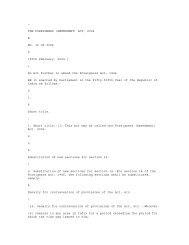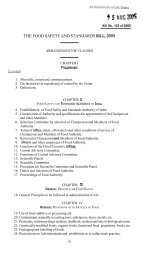TIGER TASK FORCE REPORT JOINING THE DOTS ■ANNEXURE-XI Amending <strong>the</strong> criminal provisions <strong>of</strong><strong>the</strong> Wildlife (Protection) Act, 1972■ Critique by PILSAC, New Delhi for <strong>the</strong> <strong>Tiger</strong> <strong>Task</strong> <strong>Force</strong>A. Offences and penalties● The Act prescribes various <strong>of</strong>fences andpenalties. These are discussed below:a. Any violation <strong>of</strong> <strong>the</strong> provisions <strong>of</strong> <strong>the</strong> Act, itsrules or orders made <strong>the</strong>reunder attracts apunishment <strong>of</strong> three years or a fine up to Rs25,000 or both [Section 51(1)]. A second orsubsequent <strong>of</strong>fence <strong>of</strong> <strong>the</strong> same nature attracts animprisonment term <strong>of</strong> at least three yearsextending to seven years and a minimum fine <strong>of</strong>Rs 25,000 [second proviso to Section 51(1)].b. Where <strong>of</strong>fences are committed in relation toanimals mentioned in Schedule I, or Part II <strong>of</strong>Schedule II, or where <strong>the</strong> <strong>of</strong>fence relates tohunting in a sanctuary or national park orchanging <strong>the</strong>ir boundaries, <strong>the</strong> punishment willbe at least three years imprisonment extending toseven years and a fine <strong>of</strong> Rs 25,000 [first provisoto Section 51(1)].c. Violation <strong>of</strong> provisions prohibiting trade orcommerce in trophies, animal articles and <strong>the</strong>like, derived from certain animals, would attracta punishment <strong>of</strong> at least three years <strong>of</strong>imprisonment extending to seven years and afine <strong>of</strong> Rs 10,000 [Section 51(1A)].d. Any person who teases, molests, injures, feedsanimals in zoos or causes disturbance to animalsor litters <strong>the</strong> zoo will be punishable byimprisonment for a term <strong>of</strong> six months or a finewhich may extend to Rs 2,000 or with both[Section 51(1B)].e. Persons convicted under <strong>the</strong> provisions <strong>of</strong> <strong>the</strong>Act also stand to lose <strong>the</strong>ir license or permit[Section 51(2) and 51(3)] while also having <strong>the</strong>irlicense under <strong>the</strong> Arms Act, 1959 cancelled/reinforced by an order that no re-issue <strong>of</strong> armslicense be made till up to five years from <strong>the</strong> date<strong>of</strong> conviction [Section 51(4)]. They will also haveno claim to <strong>the</strong> vehicle used while <strong>the</strong> <strong>of</strong>fencewas being committed [Section 51(2)]. It alsobecomes difficult for persons convicted toreceive bail under Section 51A.f. Persons who, without reasonable cause, fail toproduce <strong>the</strong> things <strong>the</strong>y are required to produceunder <strong>the</strong> Act, will be guilty <strong>of</strong> <strong>the</strong> <strong>of</strong>fence[Section 50 (8)].g. It is also important to point out that prosecutionunder any o<strong>the</strong>r law is not barred for any act whichconstitutes an <strong>of</strong>fence under this Act, or from beingpunished for a higher punishment or penalty thanthat provided by this Act [Section 56].B. Special provisions relating to <strong>the</strong>investigation procedure1. The Act prescribes distinct and specialprocedures for investigation which are (a)different from those for <strong>the</strong> investigation <strong>of</strong> an<strong>of</strong>fence under <strong>the</strong> Code <strong>of</strong> Criminal Procedure,1973 and (b) ostensibly designed to empowerforest <strong>of</strong>ficials to initiate and participate in <strong>the</strong>investigation process so that any immediateviolation <strong>of</strong> <strong>the</strong> Act can be remedied. To <strong>the</strong> extentto which forest <strong>of</strong>ficials have been brought into <strong>the</strong>investigative process to deal with an immediatetransgression <strong>of</strong> <strong>the</strong> regime <strong>of</strong> <strong>the</strong> Act, <strong>the</strong>seprovisions are salutary. But after an initialinvestigation is enabled in this way, <strong>the</strong> procedurelimps forward, only to get ensnared as a relativelyminor case through <strong>the</strong> criminal process.2. It might be useful to recount <strong>the</strong> specialinvestigative provisions <strong>of</strong> <strong>the</strong> Act <strong>of</strong> 1972 (asamended). These are as follows:● Power to enter, search and seize● Power to arrest and detain● Power to record evidence● Duty to render assistance● Power to destroy or disposePower <strong>of</strong> entry, search and seizure:Section 50 (1) (a) allows certain <strong>of</strong>ficials, including<strong>the</strong> Director or any o<strong>the</strong>r <strong>of</strong>ficer authorised by him inthis behalf, or <strong>the</strong> Chief Wildlife Warden or <strong>the</strong>authorised <strong>of</strong>ficer or any forest <strong>of</strong>ficer or any police<strong>of</strong>ficer not below <strong>the</strong> rank <strong>of</strong> a sub-inspector, torequire <strong>the</strong> production, for purposes <strong>of</strong> inspection,any article <strong>of</strong> wildlife or license and permitdocuments to be kept by <strong>the</strong> person under <strong>the</strong>provisions <strong>of</strong> <strong>the</strong> Act. These <strong>of</strong>ficers are also givenpowers <strong>of</strong> search [Section 50 (1) (b)] and seizure[Section 50 (1) (c)].It should be noted that this immediate power <strong>of</strong>entry, search and seizure can be exercised to (a)require any animal, trophy to be produced; (b) stop avehicle or search premises, baggage or o<strong>the</strong>r things;Annexures 203
■ JOINING THE DOTS TIGER TASK FORCE REPORTor (c) seize any animal, trophy, plant in respect <strong>of</strong>which an <strong>of</strong>fence is created. An exception is made <strong>of</strong>fisherfolk who inadvertently enter by boat, not usedfor commercial fishing, into a national park.Power to arrest and detain:There is a power to arrest and detain without warrantfor something impermissible — done withoutpermission. Such a detention may not take place if<strong>the</strong> <strong>of</strong>ficers in question are satisfied <strong>of</strong> <strong>the</strong> name andaddress <strong>of</strong> a person and if <strong>the</strong> person concerned willanswer a summons or o<strong>the</strong>r proceedings that mightbe taken against him Section 50 (3). While such anapproach is conducive to civil liberties, suchprovisions work against <strong>the</strong> poor, who <strong>of</strong>ten have n<strong>of</strong>ixed address nor are able to satisfy <strong>the</strong> <strong>of</strong>ficer <strong>of</strong> <strong>the</strong>irbona fides. It should be noted that persons detainedor things seized will be produced before a magistrate[Section 50 (4)].The power to record evidence:Under Section 50 (8) (d), any <strong>of</strong>ficer not below <strong>the</strong>rank <strong>of</strong> an Assistant Director <strong>of</strong> Wildlife Preservationor Wildlife Warden shall have <strong>the</strong> power to receiveand record evidence. More importantly, suchevidence can be admissible in any subsequent trialunder Section 50 (9) before a magistrate, <strong>the</strong> onlycondition being that it should have been taken in <strong>the</strong>presence <strong>of</strong> <strong>the</strong> accused person.Duty to render assistance:Under Section 50 (7), all persons have a duty torender assistance for <strong>the</strong> purposes <strong>of</strong> (i) prevention ordetection <strong>of</strong> an <strong>of</strong>fence; (ii) apprehending personscharged with violation <strong>of</strong> <strong>the</strong> Act and (iii) for seizure<strong>of</strong> substances when exercising <strong>the</strong> power <strong>of</strong> seizureunder Section 50 (1) (c).Power to destroy or dispose:If <strong>the</strong> article seized is government property as definedin Section 39, <strong>the</strong>n <strong>the</strong> <strong>of</strong>ficer has <strong>the</strong> power to arrangefor <strong>the</strong> sale <strong>of</strong> <strong>the</strong> seized substance under Section 50(6) (a). If on <strong>the</strong> o<strong>the</strong>r hand, <strong>the</strong> article is notgovernment property, <strong>the</strong>n <strong>the</strong> proceeds <strong>of</strong> <strong>the</strong> saleshall be returned to <strong>the</strong> owner under Section 50 (6) (b).These special provisions are necessary in orderto police <strong>the</strong> various areas and regimes created by <strong>the</strong>Act <strong>of</strong> 1972. They are also hedged in by civil libertyprecautions, so that what is done is placed before amagistrate; and a person arrested may not bedetained by an <strong>of</strong>ficer where <strong>the</strong> bona fides <strong>of</strong> anarrestee are established. This does hurt <strong>the</strong> landless,but that is no reason for <strong>the</strong> provisions to beremoved. Consistent with <strong>the</strong> Constitution, it shouldbe made clear that where a person is arrested, heshould be brought before a magistrate within 24hours. The provisions that remand live or captiveanimals to <strong>the</strong> custody <strong>of</strong> <strong>the</strong> person, in whosepossession <strong>the</strong>y are, need examination.These provisions provide <strong>the</strong> enforcementprocess a healthy start; <strong>the</strong> process <strong>the</strong>n flounders.There is no provision for inviting a SpecialInvestigation Team. As soon as <strong>the</strong>se ‘immediate’acts are done, <strong>the</strong> entire case is placed before amagistrate to limp along without priority or speed.C. Method and forum <strong>of</strong> trialFollowing investigation, a case proceeds on <strong>the</strong> basisprescribed under <strong>the</strong> Code, 1973 [Section 4(2), CrPC]unless <strong>the</strong> Wildlife Protection Act, 1972 lays downspecial provisions to <strong>the</strong> contrary [Section 5, CrPC].Broadly speaking, this means:1. There is no distinction between serious and trivialcases. All cases proceed under weak trial regimes.2. All <strong>the</strong> cases proceed as complaint cases, ra<strong>the</strong>rthan serious criminal cases to be tried bysessions.3. Even as complaint cases, where <strong>the</strong> <strong>of</strong>fenceattracts imprisonment for two years or more, it istreated as a warrant case to be tried by aprocedure different from normal crimes.4. Where <strong>the</strong> <strong>of</strong>fence attracts imprisonment for lessthan two years, it is treated as a summary case, tobe tried by a less rigorous procedure.5. Very minor cases can be tried by summaryprocedures.What needs to be done?The cases need to be treated as serious criminalcases. The first step must be to differentiate betweenserious and non-serious cases and ensure that seriouscases are tried as police cases by <strong>the</strong> Sessions Courts.This has an impact on <strong>the</strong> manner in which <strong>the</strong>cases are prosecuted. Since <strong>the</strong>y are complaint cases,<strong>the</strong> police do not prosecute <strong>the</strong>m. It is left to <strong>the</strong>overworked forest <strong>of</strong>ficials to come to court and build<strong>the</strong> case before it can be taken fur<strong>the</strong>r. The cases lingeron because <strong>the</strong>y are prescribed as ‘lesser’ cases and arenot treated as priority. The prosecutors, mainly forest<strong>of</strong>ficials, are inept and lose interest. The second step<strong>the</strong>refore must be to have special prosecutors.Since <strong>the</strong>se cases randomly languish in courtsthroughout <strong>the</strong> country, <strong>the</strong>y are not monitored by aCentralised Monitoring <strong>Task</strong> <strong>Force</strong> ei<strong>the</strong>r at <strong>the</strong> stateor <strong>the</strong> Union level. So, <strong>the</strong> third step must be tocreate a Centralised Monitoring <strong>Task</strong> <strong>Force</strong> for allcases — especially <strong>the</strong> serious ones.In order to appreciate <strong>the</strong> distinctions created by<strong>the</strong> Code, it would be useful to summarise <strong>the</strong>relevant provisions <strong>of</strong> <strong>the</strong> Code. The Code makes adistinction between summons cases and warrantcases. Summons cases under Section 2 (w) mean acase relating to an <strong>of</strong>fence and not being a warrant204 Annexures
- Page 2 and 3:
THE REPORT OF THE TIGER TASK FORCEJ
- Page 4 and 5:
ContentsIntroductionExecutive summa
- Page 6 and 7:
IntroductionThe Tiger Task Force wa
- Page 8 and 9:
TIGER TASK FORCE REPORT JOINING THE
- Page 10 and 11:
TIGER TASK FORCE REPORT JOINING THE
- Page 13:
■ JOINING THE DOTS TIGER TASK FOR
- Page 16:
TIGER TASK FORCE REPORT JOINING THE
- Page 21 and 22:
■ JOINING THE DOTS TIGER TASK FOR
- Page 23 and 24:
■ JOINING THE DOTS TIGER TASK FOR
- Page 25 and 26:
■ JOINING THE DOTS TIGER TASK FOR
- Page 27 and 28:
■ JOINING THE DOTS TIGER TASK FOR
- Page 29 and 30:
■ JOINING THE DOTS TIGER TASK FOR
- Page 31 and 32:
■ JOINING THE DOTS TIGER TASK FOR
- Page 33:
■ JOINING THE DOTS TIGER TASK FOR
- Page 39 and 40:
■ JOINING THE DOTS TIGER TASK FOR
- Page 41:
■ JOINING THE DOTS TIGER TASK FOR
- Page 44 and 45:
TIGER TASK FORCE REPORT JOINING THE
- Page 46 and 47:
TIGER TASK FORCE REPORT JOINING THE
- Page 52:
TIGER TASK FORCE REPORT JOINING THE
- Page 59 and 60:
■ JOINING THE DOTS TIGER TASK FOR
- Page 61 and 62:
■ JOINING THE DOTS TIGER TASK FOR
- Page 63 and 64:
■ JOINING THE DOTS TIGER TASK FOR
- Page 65 and 66:
■ JOINING THE DOTS TIGER TASK FOR
- Page 67:
■ JOINING THE DOTS TIGER TASK FOR
- Page 70 and 71:
TIGER TASK FORCE REPORT JOINING THE
- Page 72 and 73:
TIGER TASK FORCE REPORT JOINING THE
- Page 74 and 75:
TIGER TASK FORCE REPORT JOINING THE
- Page 76 and 77:
TIGER TASK FORCE REPORT JOINING THE
- Page 78:
TIGER TASK FORCE REPORT JOINING THE
- Page 81 and 82:
■ JOINING THE DOTS TIGER TASK FOR
- Page 83 and 84:
■ JOINING THE DOTS TIGER TASK FOR
- Page 85 and 86:
■ JOINING THE DOTS TIGER TASK FOR
- Page 87 and 88:
■ JOINING THE DOTS TIGER TASK FOR
- Page 89 and 90:
■ JOINING THE DOTS TIGER TASK FOR
- Page 91 and 92:
Wildlife research has been facing s
- Page 93 and 94:
■ JOINING THE DOTS TIGER TASK FOR
- Page 95 and 96:
■ JOINING THE DOTS TIGER TASK FOR
- Page 97 and 98:
■ JOINING THE DOTS TIGER TASK FOR
- Page 99:
■ JOINING THE DOTS TIGER TASK FOR
- Page 105 and 106:
■ JOINING THE DOTS TIGER TASK FOR
- Page 107 and 108:
■ JOINING THE DOTS TIGER TASK FOR
- Page 109 and 110:
■ JOINING THE DOTS TIGER TASK FOR
- Page 111 and 112:
■ JOINING THE DOTS TIGER TASK FOR
- Page 115 and 116:
■ JOINING THE DOTS TIGER TASK FOR
- Page 117 and 118:
■ JOINING THE DOTS TIGER TASK FOR
- Page 119 and 120:
■ JOINING THE DOTS TIGER TASK FOR
- Page 122:
TIGER TASK FORCE REPORT JOINING THE
- Page 126 and 127:
TIGER TASK FORCE REPORT JOINING THE
- Page 128 and 129:
TIGER TASK FORCE REPORT JOINING THE
- Page 130 and 131:
TIGER TASK FORCE REPORT JOINING THE
- Page 132 and 133:
TIGER TASK FORCE REPORT JOINING THE
- Page 134 and 135:
TIGER TASK FORCE REPORT JOINING THE
- Page 136 and 137:
TIGER TASK FORCE REPORT JOINING THE
- Page 138 and 139:
TIGER TASK FORCE REPORT JOINING THE
- Page 140 and 141:
TIGER TASK FORCE REPORT JOINING THE
- Page 142:
TIGER TASK FORCE REPORT JOINING THE
- Page 145 and 146:
■ JOINING THE DOTS TIGER TASK FOR
- Page 147 and 148:
■ JOINING THE DOTS TIGER TASK FOR
- Page 149 and 150:
■ JOINING THE DOTS TIGER TASK FOR
- Page 151:
■ JOINING THE DOTS TIGER TASK FOR
- Page 154 and 155:
TIGER TASK FORCE REPORT JOINING THE
- Page 156 and 157:
04Action plan for changeKey recomme
- Page 158 and 159:
TIGER TASK FORCE REPORT JOINING THE
- Page 160 and 161:
TIGER TASK FORCE REPORT JOINING THE
- Page 162 and 163:
TIGER TASK FORCE REPORT JOINING THE
- Page 164 and 165: 05References
- Page 166 and 167: TIGER TASK FORCE REPORT JOINING THE
- Page 168 and 169: TIGER TASK FORCE REPORT JOINING THE
- Page 170 and 171: TIGER TASK FORCE REPORT JOINING THE
- Page 173 and 174: ■ JOINING THE DOTS TIGER TASK FOR
- Page 175 and 176: ■ JOINING THE DOTS TIGER TASK FOR
- Page 177 and 178: ■ JOINING THE DOTS TIGER TASK FOR
- Page 179 and 180: ■ JOINING THE DOTS TIGER TASK FOR
- Page 181 and 182: ■ JOINING THE DOTS TIGER TASK FOR
- Page 183 and 184: ■ JOINING THE DOTS TIGER TASK FOR
- Page 185 and 186: ■ JOINING THE DOTS TIGER TASK FOR
- Page 187 and 188: ■ JOINING THE DOTS TIGER TASK FOR
- Page 189 and 190: ■ JOINING THE DOTS TIGER TASK FOR
- Page 191 and 192: ■ JOINING THE DOTS TIGER TASK FOR
- Page 193 and 194: ■ JOINING THE DOTS TIGER TASK FOR
- Page 195 and 196: ■ JOINING THE DOTS TIGER TASK FOR
- Page 197 and 198: ■ JOINING THE DOTS TIGER TASK FOR
- Page 199 and 200: ■ JOINING THE DOTS TIGER TASK FOR
- Page 201 and 202: ■ JOINING THE DOTS TIGER TASK FOR
- Page 203 and 204: ■ JOINING THE DOTS TIGER TASK FOR
- Page 209 and 210: ■ JOINING THE DOTS TIGER TASK FOR
- Page 211 and 212: ■ JOINING THE DOTS TIGER TASK FOR
- Page 213: ■ JOINING THE DOTS TIGER TASK FOR
- Page 217: ■ JOINING THE DOTS TIGER TASK FOR



